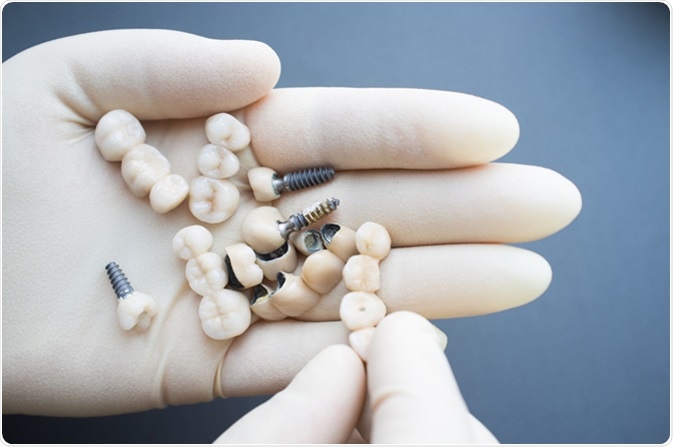A dental crown is a very effective treatment used to restore a tooth that has been damaged in some way, and it has some distinct advantages when compared with the alternatives. However, there are also some disadvantages of crowns that should be considered to make the best treatment decision for each patient. This article will cover the main advantages and disadvantages of dental crowns.

Variety of dentures. Image Credit: Golubovy / Shutterstock
Advantages of Dental Crowns
Dental crowns provide an adequate solution to a range of dental problems. They are able to:
- Support a tooth that has been significantly damaged by decay
- Protect a tooth that has worn away from being damaged further
- Protect a tooth after a root canal procedure
- Hold a severely cracked or broken tooth together
- Cover a dental implant
- Improve the appearance of a tooth by changing its shape or color
Dental crowns are a good long-term option because they are durable and usually last for at least 5-15 years, which increases patient satisfaction with the treatment.
Treatment with dental crowns has a high success rate with respect to either other dental restoration methods or no treatment at all. This has been supported by various scientific studies which researched their use.
Disadvantages of Dental Crowns
However, there are also some disadvantages of dental crowns, such as the need to file the tooth into the right shape before the crown can be fitted, This is often extensive and irreversible.
Some patients may experience discomfort shortly after the procedure, particularly sensitivity to hot or cold. Using a toothpaste designed for sensitive teeth when brushing can help to reduce this. Another issue is pain or sensitivity when biting down, which is most often caused by the crown being too high and obstructing the teeth on the opposite jaw. Fortunately, this can easily be remedied by adjusting the height of the crown.
Crowns may sometimes become chipped, particularly those made of porcelain. It is possible to repair small chips without removing the crown, while larger or multiple breaks in the crown may require its complete replacement.
In some patients, the dental cement used to hold the crown in place may wash away. This can cause the crown to become loose and allow bacteria to enter underneath the tooth, resulting in tooth decay. Occasionally the crown may fall off completely, usually due to the improper fit of the crown or the use of insufficient dental cement to hold the crown in place, requiring refitting or replacement of the crown.
Rarely, an allergic reaction may occur to porcelain or one of the metals used to form the crown.
Dental crowns tend to be more expensive than other direct tooth restorations, which may be an inhibitory factor for some patients. The cost depends on the material of the crown (porcelain crowns tend to be more expensive than gold crowns, for example) and may range from $800 to $1500 per crown.
Weighing Up the Advantages and Disadvantages
The risks and benefits of a dental crown should be considered for each patient to ensure that the best recommendation and procedure is followed for every individual.
As an example, a bridge with crowns is sturdier than removable partial dentures when the aim is to restore a missing tooth between healthy adjacent teeth. However, implants are now generally considered to be a better choice than crowns if the funds are available, because they do not affect the healthy adjacent teeth, and there is a lower risk of infection underneath the bridge.
Therefore, if a patient is able to pay for a dental implant, this may be the better option. If they would prefer a durable but cheaper option, dental crowns with a bridge may be the best option.
It is important to consider the purpose of the procedure and decide the appropriate course of action in the best interests of the patient.
References
Further Reading
Last Updated: Feb 26, 2019